 Home | City Notes | Restaurant Guide | Galleries | Site Map | Search | Contact
Home | City Notes | Restaurant Guide | Galleries | Site Map | Search | Contact
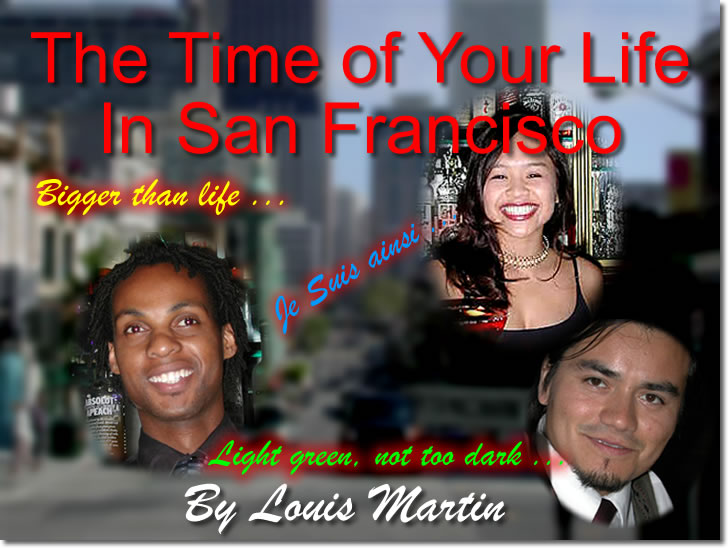
I don't know what it means. It's just a fun thing to do. While presidents drop bombs and lovers thrash out the details of their relationships and businesses scramble for mindshare and marketshare and any other kind of share they can get their hands on, I just go walking. No one gets put down with deadly force, no one is forced to "commit," and I'm never richer for it. But walking is my form of fun and it makes me feel free. For an hour or so I'm a Pacific breeze fresh ashore, visiting my favorite city. I blow around town.
At first I'm Robin Goodfellow messing up her hair, lifting her skirt, knocking the hat off an old man's head, sending it tumbling down the street, or blowing a plastic bag into the eyes of some young entrepreneur. Then I settle into visiting my favorite spots, bars, restaurants ...
Now I'm not talking about the Sunset
or the Richmond or Bernal Heights or Pacific Heights. I have no interest
in those places. I'm talking about downtown, Chinatown, the Tenderloin,
Belden Place and Claude Lane—the French Quarter, or as
some might argue, the European Quarter—parts of the Embarcadero,
a bit towards Fishermen's Wharf, and North Beach for sure. I'm 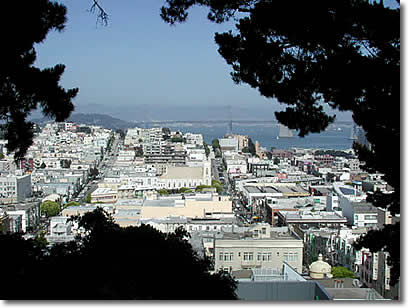 talking
about those areas that surround Nob Hill and Russian Hill where somedays
it is clear and you can see everywhere, somedays the fog has moved in
like on Mount Olympus and it is cool but not cold and you can see nothing
going on below, and somedays there are shreds of high clouds driven
by the wind towards the East Bay.
talking
about those areas that surround Nob Hill and Russian Hill where somedays
it is clear and you can see everywhere, somedays the fog has moved in
like on Mount Olympus and it is cool but not cold and you can see nothing
going on below, and somedays there are shreds of high clouds driven
by the wind towards the East Bay.
But let's get off the hill and start somewhere. How about North Beach and Enrico's on Lower Broadway with all those bawds & broads? Head down Broadway from up on the hill and you will feel like a descending god. You will see all over the city and all over the bay despite the Transamerica Building and the Bank of America and newer threats to the city's skyline. You will also spot Big Al's below where Columbus cuts broadway. I don't know what Big Al's is now or used to be, but it is a small kind of big that adds a little color to a dull world. And spank dog, or it that thank god?, it is not "proper." No committee ever signed off on Big Al and Big Al's sign, though to remove it now would probably take a committee, as it is part of North Beach and its colorful past. And did we fail to mention the Condor at the corner and Carol Doda's historical big boobs? We did indeed. It's a landmark now, so just read up on it. This is a walking tour, the real thing. Onward!
We are approaching Big Al's now and we walk right by. "A walk-by tour?" you ask. In this case, yes. We do not need a stripper's costume or a large plastic glowing penis. And we don't need cigars at the store next door, where the prices would drive Big Al nuts, because Big Al was no fool when it came to money. We walk on down Broadway towards Enrico's but we stop for a moment to say hello to Dwayne, manager of the Hungry i. As usual, Dwayne invites me in to visit "the girls" but I tell him next time. The Hungry i has not been quite the same for me since Sunday left. Remember Sunday, the bartender who was studying music at San Francisco State? A perky, refreshing little filipino girl with a hell of a figure but not inclined to show it off on stage. It was just a lot of fun talking with her. And back then I was trying to figure out the sex industry in San Francisco; it was new to me. Mainly it was a matter of figuring out who the girls were and why were there and how they felt about it. Mostly I found college kids acting out a fantasy. Later on there was Nina, also a looker like Sunday, working the bar and always full of insight. "They like to be treated like movie stars," she would say. They would ask her to do them favors, as if she were part of the stage crew. But enough. Sunday and Nina are gone and I now know more than I need to.
I stand for a moment with Dwayne while he describes for me the two types of people who walk by the Hungry i. There are those who are friendly and hip, who nod, say hi or show some sign of recognition; and there are those who stick their nose in the air, as if to say, "I don't go in places like that." My brother did that one time when Dwayne invited us in. I was embarrassed and later apologized to Dwayne. "I know, I know," he said. "For some it is just a gut reaction." Sometimes I like to stand for a moment with Dwayne facing the street and watching the people walk by. Hip or uptight? And what's it to you, anyway?
But off I am to Enrico's now. The grand man has long
been gone, though he is still here on earth somewhere. Unfortunately,
the government deposed Emperor 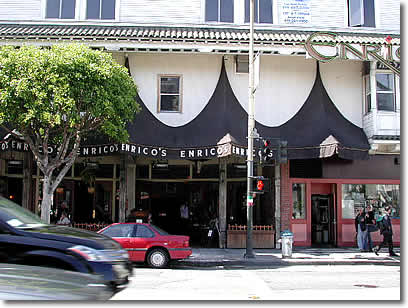 Enrico
some years back over tax matters and I think he has never been quite
the same. He played a grand roll in North beach back in the 50s, 60s,
and 70s. And without his place, life, I think, just ain't the same hip
thing it was. It must have been truly grand back then, or the legends
would not still persist as they do. Enrico's ability to have fun was
prodigious, but apparently he was not much of an accountant. Not surprising:
accountants are not known for fun. Ward Dunham, now one of the owners
and a guy who has been around Enrico's since day one, explained it to
me one day:
Enrico
some years back over tax matters and I think he has never been quite
the same. He played a grand roll in North beach back in the 50s, 60s,
and 70s. And without his place, life, I think, just ain't the same hip
thing it was. It must have been truly grand back then, or the legends
would not still persist as they do. Enrico's ability to have fun was
prodigious, but apparently he was not much of an accountant. Not surprising:
accountants are not known for fun. Ward Dunham, now one of the owners
and a guy who has been around Enrico's since day one, explained it to
me one day:
"Back then," said Ward, "Don Fagoni or maybe someone else would show up and Enrico would go to the cash register, open it up, grab a fistfull of twenties, and off they would go. He didn't even close the register door."
Ah, what fun that sounds like. Who does that nowadays around San Francisco? Right, no one. As pianist and author Don Asher put it, Enrico was bigger than life. There are two others Don says are, or were, bigger than life: Herb Caen and Willie Brown. Who's bigger than life now in San Francisco? Who knows how to have serious fun these days? Who has built a life around it? Can't think of anyone? Will maybe tonight, just before you retire early with book and camomile tea, a name will come to you.
But damn! Double damn! Let's get inside this place and order a drink. Out of my way young fellow with all the tattoos and staring down at your phone! I'm a man in need of a drink.
Now I started early enough today that the big, high bar, seemingly made for giants, is empty. That is just the way I like it. I take the stool at the end near the patio where the bar curves over toward the wall. The wall gives me comfort and the poster of a long-ago party, signed by Richard Brautigan and others, makes me feel at home. You know, the one with the devil holding a long barbed penis and pissing?
But now let's order that drink. The sad thing is that
Dave Nepove, another Enrico classic, is gone now, lured away
by Southern Wine & Spirits. He has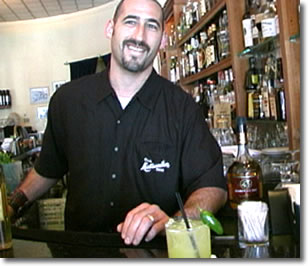 a
very good job at that company, I'm sure. He goes around as a consultant,
teaching other bartenders his magic, but he is not replaceable at Enrico's.
There should be a plaque. Dave is the guy who turned Enrico's, at least
for a period of ten year, into the best bar in the city. It became the
meeting place for the City's best bartenders and the hub of the San Francisco
Bartender's Guild. The likes of Marco Dionysus and Thomas Waugh once
worked the bar and hung out afterwards, and creativity took the form
of strong libations unavailable anywhere else. There was even rumor of
a divine plan to move the whole bar with staff to Heaven. It is true
that Our Father Who Art does enjoy a good cocktail now and then.
a
very good job at that company, I'm sure. He goes around as a consultant,
teaching other bartenders his magic, but he is not replaceable at Enrico's.
There should be a plaque. Dave is the guy who turned Enrico's, at least
for a period of ten year, into the best bar in the city. It became the
meeting place for the City's best bartenders and the hub of the San Francisco
Bartender's Guild. The likes of Marco Dionysus and Thomas Waugh once
worked the bar and hung out afterwards, and creativity took the form
of strong libations unavailable anywhere else. There was even rumor of
a divine plan to move the whole bar with staff to Heaven. It is true
that Our Father Who Art does enjoy a good cocktail now and then.
Nowadays I go in and order Nob Creek on the rocks and it is very good. But I miss such concoctions as Dave's Sweet Heat, made of Gran Centenario tequila, Licor 43, fresh lime juice and simple syrup. Yes, fresh lime juice. Dave never made a drink unless it used fresh-squeezed juice and squeezed fresh right in front of you. Then there were drinks like The Knack by Thomas Waugh. Modern, right-now, classics.
But Nob Creek is good and I sip it slowly. They do a good job back there in Kentucky. Michael is there in beret, acting as maitre d', and he tells me that people sometimes ask him if he is Enrico. He does indeed look somewhat like Enrico used to look but he keeps his fist out of the cash register (he does, doesn't he?) and behaves like a professional. And there is nothing particularly wrong with that; someone needs to.
But I did not mean to spend so much time at Enrico's. It is just that it is a good starting point. One cocktail gets you going. Then you can move off in several directions. You could go up into the touristy part of North Beach and on over to Washington Square and Moose's and the Washington Square Bar & Grill. You could have a Martini and try to spot the ghost of Herb Caen. It is there somewhere, I'm sure. But my favorite direction is right down Kearny from where it meets Broadway at Enrico's near the Peter Macchiarini Steps. Know Peter Macchiarini Steps where all the bums hang out?
So it is across Broadway and down Kearny we head, right
past all the little sex shops, along with Tommaso's and
its brick oven and pasta machine in the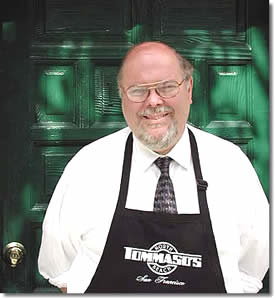 closet
by the door and piles of dried oak upstairs where tomatoes are also ripening.
No wonder they have the best
pizza in town. It is all about flavor. I
see owner Agostino Crotti by the door smoking a cigar. I cross the street
to say hello.
closet
by the door and piles of dried oak upstairs where tomatoes are also ripening.
No wonder they have the best
pizza in town. It is all about flavor. I
see owner Agostino Crotti by the door smoking a cigar. I cross the street
to say hello.
"I have my Cohiba," I tell him. Agostino smokes only Cohiba cigars, which he orders by mail. They are a little hard to come by. But I have found a store in the city that has them and have bought a small one to smoke with him. I have not brought it with me today, however, and I need to be on my way.
"Next time I will have it," I say.
"We will go upstairs to smoke," he says.
He savors the smell of the cigar, a large one on which he leaves the label, something I guess you do with a Cohiba. To remove it would be about like stripping the Cadillac emblem from your Cadillac if you owned one.
Then I'm on down the street, past Cafe Prague on Pacific. I do not stop there but would like to if I had time. That is where BJ Papa used to have some of the greatest jam session in the City on Saturday night with people like jazz singer Vicki Burns, trumpeters Greer Rocket and Michael Pitre, and others stopping by. When it was hot, which it was most of the time, it sizzled. Now there is a Sunday afternoon poetry session at Cafe Prague that attracts some truly interesting types as only poetry sessions can. There are the serious poets, and some of them are good; and there is the tall fellow dressed up in feathers; and there is the cowboy poet with guitar who could use some help tuning (and what prompted this cowboy to sing in French last time? Is cowboy campfire song about to come out of the closet?); and there are those who attend to express their political notions, which are not necessarily poetic. Mark Schwartz leads this grand event, which welcomes all types. You can even buy one of Mark's book there, "The Jokes on Me."
"No, me," says me.
"No, me," says Mark.
"Well, aren't we saying the same thing?" I say.
"Yes, but we mean different things by it."
"We do?"
"We do."
"Well, we sound like were in agreement now."
It will make you chuckle, not just laugh. Chuckling is good. I'm not always so sure about laughing.
But we pass by Cafe Prague today, and we hardly think
about
Bix, just a block over on Gold Street off Montgomery
where Montgomery turns into a quiet  little
tree-lined street, no longer the rushing thoroughfare it is downtown.
But I do give Bix a thought or two. If it were Sunday evening I would
stop by. The reason? Pianist Don Asher. Don Asher is not bigger than
life. Don Asher is life. He is also good taste, intellect, and a history
lesson. He is fine, refined, sublime, and a lot of other good rhymes.
And when he plays it sounds like the timeless melody from a music box.
Time stops, though the rhythm goes on, and you listen as you might to
the soulful sounds of a harp.
little
tree-lined street, no longer the rushing thoroughfare it is downtown.
But I do give Bix a thought or two. If it were Sunday evening I would
stop by. The reason? Pianist Don Asher. Don Asher is not bigger than
life. Don Asher is life. He is also good taste, intellect, and a history
lesson. He is fine, refined, sublime, and a lot of other good rhymes.
And when he plays it sounds like the timeless melody from a music box.
Time stops, though the rhythm goes on, and you listen as you might to
the soulful sounds of a harp.
Don played with Enrico's original band at the Hungry i when people like Barbara Streistand and Woody Allen and Mort Sahl and Bill Cosby were there getting their start. He is a bit of San Francisco history that is still with us. And he still plays Moose's on Sunday. He played at Hotel Majestic on Sutter until the grand old dining room was shut down a few years ago. That is where I first ran into Don. He is an author too and a man with stories. I like the little one he told me about the time he took some folks to dinner. "I guess I was a little drunk," he said. "Instead of 10 percent tip, I put down one percent." Ten percent was a pretty good tip back then, he lets me know.
The waiter, looking perturbed, took him aside and asked him, "Hey, I gave you pretty good service, didn't I? Look at this." He showed Don the bill with the one percent tip. Not caring for the waiter's attitude now, Don decided to let it stand.
Moving down Kearny I pass Louie's California Kitchen. That brings back memories of the late Jing Ming Liu. For a person with little money, she did not lack for high-class taste in food. Louie's is listed in the San Francisco Restaurant & Dining Guide, a publication with which I'm proud to be involved. Louie's was recommended by one of our writers, Nina Wu. I know Louie a little. So I take Jing Ming there for dinner one night but it is apparent from the start that she does not think much of the place. She often made very quick judgments about restaurants. One glance, one whiff, one small impression and she had made up her mind, case closed, that a place was either ma ma hu hu (so so), or, in a higher rising voice, hen hau (very good). Hen hau usually meant very expensive too. Price and quality seemed firmly locked together in her mind.
Anyway, Louie himself comes over to wait our table. And as usual, there is a long discussion over the menu. Here, however, it goes on for five minutes. There are other customers in the place. At last Louie looks like he has given up and walks off. I'm wondering what is going on till he suddenly returns with a bowl covered by a white dish towel. He brings it over to the table and gently removes the towel. A fish is flopping around in the bowl. Jing Ming smiles slightly as if to say, okay, I guess that will do. Louie walks off with the fish. Still she does not have much good to say about Louie's California Kitchen.
Further down the street on Kearny is a place she loved, R&G Lounge. I, on the other hand, have somewhat mixed feelings about it. Yes, it is listed in the San Francisco Restaurant & Dining Guide. That is surely a good thing. Not all restaurants get a listing there. And most people seem to think it is the best Chinese restaurant in Chinatown. I won't argue that. It probably is. What I don't always like is the pace. Now who is to argue with good fast service? Certainly not I. However I'm not sure I like waitpersons with headphones. While it gets the order to the kitchen fast, your waitperson seems to be looking right through you. I like to be looked at, not through.
Now heading on down Kearny towards Sacramento, California, Pine, and Bush, you want to look around at some of the buildings along this wide thoroughfare. They are more interesting than you might think at first. Most are low old buildings constructed after the earthquake in '06. At first glance, Kearny is not a particularly handsome street. It seems but a wide swath of asphalt cutting down from Lower Broadway to Market Street. Nothing particularly interesting about that in San Francisco. No hills, except the initial descent from Broadway, no twists, no curves. With no such feminine charms, it seems most unlike San Francisco. It simply gets you from point A to point B as a street in San Jose might. How dull can you get!
But take a look at some of the old buildings, most of
them small, and you will see style unfound in any of
the newer construction that has gone on in the 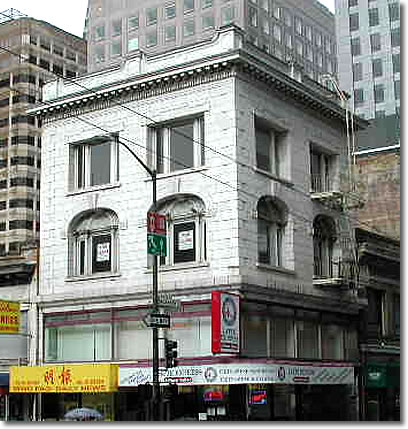 surrounding
area since the 70s. The most striking contrast is the little three-story
building at the north-east corner of Sacramento and Kearny—solid
and sturdy—and
the Hilton opposite Portsmouth Square, also known as the "Chinese
Park".
Nothing could have less class than the Hilton. Formless and colorless,
it is as ugly as a building can get. Stare at your thumb
or anything else, then at the Hilton, and you will know the difference
between good design and bad.
surrounding
area since the 70s. The most striking contrast is the little three-story
building at the north-east corner of Sacramento and Kearny—solid
and sturdy—and
the Hilton opposite Portsmouth Square, also known as the "Chinese
Park".
Nothing could have less class than the Hilton. Formless and colorless,
it is as ugly as a building can get. Stare at your thumb
or anything else, then at the Hilton, and you will know the difference
between good design and bad.
But let us move on down toward Pine Street, where we cross Kearny, turn down Pine, then head into Belden Place, a little alley that runs between Pine and Bush. Take a good look. It is nothing but an alley. And yet it is has bright color and life. Within this narrow confine, there are many small restaurants with tables spilling out into the alley. It is a touch of Europe in the nothingness of a back alley. It is so small yet it holds so much. Does that mean that nothing is more? Or that smaller is better? Maybe. It certainly beats the Carnelian Room at the top of the Bank of America Building. Even know about the Carnelian Room? If you're in the business world you probably do. Or if you like exclusive dining far from the grime of the street and close contact with other people, this is your place. "But it has a view," I hear you say. Yes, indeed it does. So let us soften our opinion of this place with a view. Views are wonderful in San Francisco and we still have much to look at despite high buildings with views.
But let us go back down to Belden Place and walk the alley. You could eat at Brindisi, an Italian seafood place where sexy Suhana used to work or maybe still does, but let us skip it. She was not all that nice the last time you came by. You could stop at the Vodka bar, be blasted out of the place by loud music so exciting to the young, especially those with no musical abilities whatsoever. But we are not that enamored of young folks loaded on Vodka, something few of them understand or appreciate. Let us walk on for now. You could go into a new place called Traverna that Michael Bower, San Francisco's Proust of restaurant critics, threw such praise at a little while back that even the owners were baffled by it. Or we could eat Catalan at B44, and that would not be a bad choice if you like good red wine and bold flavors, although you could probably do better in the Cerdanya Valley in Spain, where I sometimes visit my daughter and dine royally. So I'm going to walk on by this time. And then there is Plouf, a name that I always enjoy saying. Plouf, my dear. Let us remove some clothes and go plouf in that pool over there. The moon is out tonight. "But I'd rather not," she says. So let us move on. Tiramisu?, I ask. Not tonight, she says. But it is good.
So here I am as usual at Cafe Bastille,
where I'm told I'm a regular. A regular regular? Not quite, but regular
enough. I usually glance in to see if Fredric, the tall thin French
black bartender with the voice of a singer, is there. If he is, I go
for the stool by the cash register. Other stools will do too. I think
there are only  four and all are close enough to the register. I can hear
Fredric's voice, its mellow sound:
four and all are close enough to the register. I can hear
Fredric's voice, its mellow sound:
"What would you like to drink, Louis?" he asks. Nothing worth quoting in the those words; it's the way he says it, slowly, melodiously.
I'm not always sure what I want to drink.
"Whiskey, I think, or maybe a Sidecar. No, Whiskey. What do you have?" I ask for the hundredth time. And Fredric's eyes move to three Whiskey bottles behind the bar, guiding my eyes with his to their roosting spot.
Truth to tell, they don't have any really great Bourbon Whiskey at Bastille, which is what I like best. But they have Wild Turkey, which is not bad. I order that.
Fredric could really just grab the Wild Turkey when I come in and start pouring, but it is nice to have choices. Maybe someday I will actually order a "Sidecar" and Fredric will be shocked.
Fredric seems in a bit of a funk right now. A friend went off to Paris, leaving him alone. He does not feel like going out much. I try to convince him that he should get out anyway.
"No money," he says, but I think that is just a kind of excuse for staying in. Well, it's nice to go through moods if you don't carry it too far. Makes you appreciate the highs that come after the lows, the manic swing.
"Oh, does it?" you ask. "Well, the last time I was down I almost cut my wrists, buster! You can have your lows but I can do without them."
"Well, I didn't exactly mean that low. Why didn't you tell me you were feeling low, Sarah?"
"Too low to say so."
But Fredric is going to pick up soon, I'm sure.
There is also Edgar Sierra at Cafe Bastille. He is the soulful, bright-eyed executive chef. Under his guidance the menu at Cafe Bastille remains very French but is also juiced up by California cuisine and a Mexican influence that never lets French become dull. Dull French is bad French and leads to ennui.
"Je suis ainsi ennuyeux," she says.
"Pourquoi?" I ask.
"Le repas ennuyeux."
No worries. Your dinner will never bore you when Edgar
Sierra is around. A little chile pepper keeps it lively, a little squirt
of lime juice, a tangy bit of goat cheese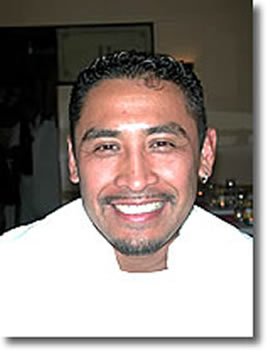 where
you would least expect it. "But is this French?" I hear
you ask. It is a variation, a way to personalize it to California
taste, and I think not a bad thing. And it is far better than slavish
imitation.
where
you would least expect it. "But is this French?" I hear
you ask. It is a variation, a way to personalize it to California
taste, and I think not a bad thing. And it is far better than slavish
imitation.
I order his Ahi tuna crab cake—it is chopped raw and with little chunks of pineapple—then move on down the alley with its taste still in my mouth. I pass Sam's this time but that is a wonderful place if you want to experience the richness of San Francisco dining of a hundred years ago. Beautiful steaks, seafood of all kinds, platters of vegetable simply and beautifully prepared. It is not cutting-edge cuisine but mouthwateringly good when you are really hungry. It reminds me of Sunday dinner at my grandmother's house without the family arguments.
So now we are on the corner of Kearny and Bush and wondering where to go next. Or to be honest, there is no "we" here. It is just "I". There could be a she if she would shape up or I would shape down but that doesn't seem to be in the cards.
"Shape up," I say.
"No, you," she says.
"Up or down?" I ask.
"Either way would do," she says.
"One way would surely be better than the other. Don't you have some kind of preference. Or some kind preference. Or some preferred kind?"
"Oh, get out," she says and we are right back to square one. It's okay. I couldn't afford her anyway.
So now I begin to think of that other little alley, even
smaller, just up the street on Bush. Actually, they call it a lane. A
lane by the name of Claude. Claude Debussy Lane? Claude l'apres-midi
d'un faune Debussy Lane? No, I don't think
so. Just a lane. No nuages.
But consider this, Mozart: This was part of the original French quarter
in San Francisco, and where haut cuisine began. I probably remember
the story all wrong but I think this much is right: There was a Frenchman
back in the 1880s who began importing Champagne and various delicacies
from France. It turned out there was a taste for the stuff. Not all early
San Franciscans were as crude and rough as people thought. Sure, pan
for gold one day and kill grizzly bears; the next drink Champagne and
eat caviar. Sound like bipolar San Francisco? You bet it does. Well this
guy, or someone else, opened a restaurant right up the street on Bush
called
Le Poulet D'Or, or the Golden Chicken. Though the
early ruffians had a taste for the drink and the food, they couldn't
pronounce "Poulet
D'Or." It became known as the Poodle Dog. Not a
very flattening name, of course, but that was the best they could do.
It was said that if you came with your mistress you ate upstairs and
could use the little rooms in the back, and if you came with your
wife you ate downstairs. I don't know if that is true or not. But everyone
smiles when they hear this, so I prefer to think it is true. I am not
very scientific when it comes to smiles.
think
so. Just a lane. No nuages.
But consider this, Mozart: This was part of the original French quarter
in San Francisco, and where haut cuisine began. I probably remember
the story all wrong but I think this much is right: There was a Frenchman
back in the 1880s who began importing Champagne and various delicacies
from France. It turned out there was a taste for the stuff. Not all early
San Franciscans were as crude and rough as people thought. Sure, pan
for gold one day and kill grizzly bears; the next drink Champagne and
eat caviar. Sound like bipolar San Francisco? You bet it does. Well this
guy, or someone else, opened a restaurant right up the street on Bush
called
Le Poulet D'Or, or the Golden Chicken. Though the
early ruffians had a taste for the drink and the food, they couldn't
pronounce "Poulet
D'Or." It became known as the Poodle Dog. Not a
very flattening name, of course, but that was the best they could do.
It was said that if you came with your mistress you ate upstairs and
could use the little rooms in the back, and if you came with your
wife you ate downstairs. I don't know if that is true or not. But everyone
smiles when they hear this, so I prefer to think it is true. I am not
very scientific when it comes to smiles.
Now did I already say this? The best restaurant in Belden Place is not in Belden Place; it's on Claude Lane and it's name is Cafe Claude.
At the corner I smiled a little then decided to head to Cafe Claude. But wait, I think. There is Le Central midway up the street and Cafe de la Presse at the corner of Bush and Grant. Let's head that way first.
The remodeling job on Cafe de la Presse last summer was terrific. And initially the service was good as well as the food. When they reopened last summer they had so many new wait people that they were tripping over each other. Things were supposed to settle down into a groove. Maybe they have but I have not noticed that things are really groovy yet, as the staff seems to change with the weather. Nevertheless, this is not a complaint; they are doing okay. However, when I went in the other day to get an espresso (this is a complaint), the order was taken, then nothing happened. Despite few customers, no staff person headed for the espresso machine to make it. Finally I just left. The magazines are still there, maybe even more than before, but I'm not sure if they are selling them. It may be more for effect now. Cafe sans la Presse does not sound so good. In the beginning Aqua executive chef Laurent Monrique was often there and it was a delight to see him. So was general manager Maria Hilario-Fendert, who was a delight to look at. But I'm not seeing them so much anymore. I hope Cafe de la Presse is getting la attention from Aqua that it deserves. The location on Bush and Grant is so good that it could easily be neglected and still do quite well. But that would not be the French way, would it?
Even I need attention and I'm not a restaurant.
"You need attention, sir? What are you talking about? Aren't all your needs met?"
"Met any needs lately," I ask.
"Needs?" says the voice. "Who needs 'em?"
But back to business.
Closer to Kearny on Bush
is Le
Central, a San Francisco classic for some thirty years. Herb
Caen used to lunch there with his classic caste of characters: Wilkes
Bashford, Willie Brown, Harry de Wildt ... Willie Brown still has lunch
there every Thursday, if I'm not mistaken. It's kind
of a kick to walk by 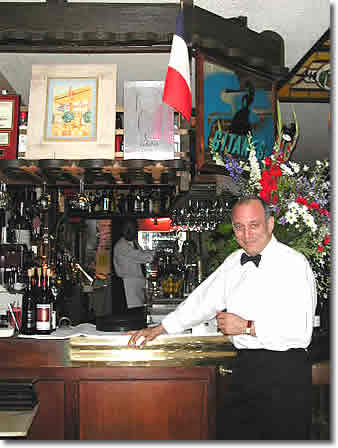 and
see him in the window. And waiter-actor Louis Parnell is still there.
Remember his performance in the Violet Hour? Imagine such talent serving
you lunch. It doesn't seem right. Toni is still in back of the bar pouring
drinks with her reserved good humor. And Heather seems to be a permanent
fixture now. I was in the other day when it was quiet and she confided
in me that she was finally concerned with "health
issues." Some
of us take a long time to be concerned about our own health. "Have
another drink and just forget it," is one prevailing philosophy
in San Francisco. Or wait until you get sick. "But I already am," you
say.
and
see him in the window. And waiter-actor Louis Parnell is still there.
Remember his performance in the Violet Hour? Imagine such talent serving
you lunch. It doesn't seem right. Toni is still in back of the bar pouring
drinks with her reserved good humor. And Heather seems to be a permanent
fixture now. I was in the other day when it was quiet and she confided
in me that she was finally concerned with "health
issues." Some
of us take a long time to be concerned about our own health. "Have
another drink and just forget it," is one prevailing philosophy
in San Francisco. Or wait until you get sick. "But I already am," you
say.
Since I'm not sick, I think I'm going to avoid this issue and just have another drink. Cheers!
I'm sort of a regular at Le Central and not. An irregular regular? I can handle that. I think you need to be a banker to be a genuine regular and you need to eat lunch there at least a couple of times a week, preferably with a young woman to whom you're not married. And you gotta talk money. I don't talk money and I got no wife to cheat on so that kind of leaves me out of being a somebody. That's just fine. I'm glad to be a nobody or an anybody or a noanybodynobody. As long as my drink comes, je existe.
"Sir, you persist in such nonsense. How are you ever going to become a banker?"
"A banker or a bank her? So what's she worth?"
"In Euros or US dollars?" asks the voice
"In Your Ohs!" I say.
"Such gibberish, sir. Really!"
"Well, if that's what you think, I'm outta here. Or yer nerves hers blurs the scene."
So let's pay a visit now on Cafe Claude. That is a place you can take seriously. According to owner Franc Le Clerc, the little details matter. Hear that, Cafe de la Presse? All you other restaurants with a great location? And he is there most of the time to see that they get the attention they deserve. They do. But it is not a place of uptight detail. So what makes Cafe Claude work? A whole bunch of little things, none of which glares at you saying "top this if you can."
"It is subtle," says Franc. But customers do notice, either consciously or unconsciously.
For one thing there is the food: New chef
Philippe Chevalier is responsible for that. Under old chef Brenda Buenviage
the food wasn't bad but it got better when
the 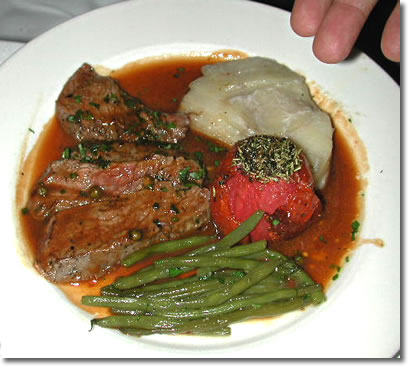 award-winning
chef from France arrived on the scene some six months ago. You can see
him around the place. He is the handsome-looking young man dressed in
karote black, not the traditional chef's white. I was impressed the other
day when I mentioned a desert I had eaten a few weeks back at Torre
de Remei, a castle in Spain. The body
of the desert, ice cream and more, was covered, but not touched, by a
web of spun sugar. "That
is a cradle," he said. "You make it separately like this ... " Stupid
me. I haven't been to cooking school. I took it for some kind of miracle.
Anyway, I like talking shop with chefs and Philippe accommodates. Aside
from love and caring, the difference is in the details.
award-winning
chef from France arrived on the scene some six months ago. You can see
him around the place. He is the handsome-looking young man dressed in
karote black, not the traditional chef's white. I was impressed the other
day when I mentioned a desert I had eaten a few weeks back at Torre
de Remei, a castle in Spain. The body
of the desert, ice cream and more, was covered, but not touched, by a
web of spun sugar. "That
is a cradle," he said. "You make it separately like this ... " Stupid
me. I haven't been to cooking school. I took it for some kind of miracle.
Anyway, I like talking shop with chefs and Philippe accommodates. Aside
from love and caring, the difference is in the details.
Then there is the new paint job. It did not change the restaurant that much but it softened the appearance and made it look nicer. Compare that to the paint job at Cafe Bastille and you will understand what I mean. Then there is the bar with the big glass jars in which vodka is being infused with fresh herbs and fruit, the handy work of bartender Joel. The coconut infusion is particularly outstanding. And then at night there are the little candles in back of the bottles on the bar, making it glow warmly. It looks like you feel when you have had a glass of wine or two. You see the glow, feel it, but don't necessarily give it a thought.
And then there is the music, featuring such notables as Marcus Shelby, bassist and composer, whose latest CD, Port Chicago, you might want to check out. Marcus not only brings his own considerable talent to the gig; he is a magnet for other great talent. Catch him if you can; he's a bit illusive. Catch Belinda Blair. Catch Lori Carsillo. Whoever picks the musicians does so with care.
Then there are the ladies who run the place, ladies of the night but no prostitutes: Sophie, Leila, Delphie. Sophie, who speaks both French and Spanish because she is a mix of both, Sophie of the long brown hair and sharp beautiful features; Delphie who is more sexy than sex itself and knows it and Type J for Jealous and admits it; and warm, friendly Leila who glows like a ruby. These ladies will take care of your needs—or at least some of them—and will make you feel as close to Heaven as you are going to get in a restaurant in San Francisco.
Now Heaven is a lot of fun but no one is allowed to stay there too long. So I'm headed out the door wondering just where to go next. What if my aunt from Florida were in San Francisco and I wanted to show here around? Where would I take her? I always ask myself that question when I don't quite know what to do. Her name is "Aunt Lucille" but I always call her "Auntie El."
"Auntie El," I ask, "what would you like to do?"
"I'd like to go fishing," she says.
Auntie loves to fish. We once went down to Half Moon Bay and took one of those charter boats out and she had the time of her life.
"No, auntie, I mean here in the City? Is there anything you want to do?"
"Whatever you want, dearie. I like almost everything."
"How about some art, auntie? Do you like art?"
"Oh, yes, I liked Art a lot. He was such a handsome man. Is he in San Francisco now? He did like to get around. Oh, what a man!"
"Funny auntie, dear auntie, I mean like painting, the stuff that artists do!"
"Oh, Art was an artist. No man knows a woman's heart like Art did."
"Oh, Auntie, stop it. Art is not here. Let's go drop by Weinstein Gallery on Geary. We can look at the works of Anne Bachelier and Jean-Claude Gaugy and Guam Zeju ..."
"Sound like a lot of Frenchmen," she said, "except for that last one. Where's he from?"
"Let's just go and make our visit, Auntie."
"Will we hear mermaids singing?"
"I don't think so."
The new Weinstein Gallery on the corner of Powell and Geary is huge. From the end of the alley at Claude Lane, we had walked up Sutter to Powell, then over to Geary. It is the largest commercial gallery in San Francisco. If you like larger spaces in which to view art you will have to go to the De Young.
"Why so large?" asks my auntie.
"Many artists, many paintings," I say.
"But are they all good?" she asks. "And what makes art good?"
"Auntie, auntie, auntie, you're not supposed to ask such questions."
"Dear boy, I ask whatever questions I want. San Francisco is a free country, isn't it?"
"It's a city, auntie, not a country. If we were a country we would not be killing people in Iraq. We would not ..."
"Yes, I know. That Bush man is really quite evil, isn't he?"
"You said it, auntie, not me."
"So just tell me, do you like that painting there?" she asks, pointing with a slim finger with a ring and red nail polish.
"Odd Nerdrum? He's kind of a strange one, isn't he?"
"More than strange, my dear boy. He seems positively perverse to me. A very unhappy man, I think."
"Well, now all happy paintings would be kind of dull, wouldn't it? I think he has strong 'inner complexes' that he represents in his paintings. Maybe they represent the strong inner complexes of the people of Norway, who knows?" I offer.
"Like our Mr. Bush?" she asks.
"Yes, perhaps like our Mr. Bush and the people who voted for him. People who are stubborn but not very smart, people who are self righteous and want to impose their wills on others, people who are not well read and speak like English is their second language but it it their first, ungraceful people who ..."
"Well, at least this Mr. Nerdrum doesn't kill people—He doesn't, does he?—so I guess it's okay with me whatever he likes to do or say. But is he a good painter?"
"He's memorable," I say and leave it at that.
"And what about this one?" she asks pointing at a piece by Brad Noble called "Beyond the Fence."
"Yes, I think he is very good," I say, stepping out on a limb.
"What are those people doing there in the grass?" she asks, again pointing a finger with red nail polish at it.
"Struggling," I say, struggling myself for an explanation.
"And what's going on on the other side of the fence? Why is there so much light? What is that car doing? It is a car, isn't it? And whose dog is that. He does not look very friendly ..."
"Mr. Noble likes to ask question in his paintings. He likes to leave you wondering."
"Sound like your late uncle Phil. He was that sort of man too. I never could figure him out. Not completely. Too bad he wasn't a painter. Maybe he could have been in a nice gallery like the Weinstein's and earned a living instead of going to jail as he did that time ..."
We were standing in front of a painting now by Guam Zeju. It was of an extremely well-built Chinese woman.
"Oh, my," said my auntie, "she certainly is, uh, well you know the word for it."
The painting was "Millennium's Mirror" showing on the left side a young Chinese woman stripped to the waist and on the right side a traditional Chinese woman with stylized hair forming a large bun over her head, sort of like the once-popular beehive of the 1950s. There are pink flower petals on the floor and a little dog with a bow on its neck between the two women. The young woman is extremely attractive. She is soft and shapely, making you want to touch. The woman on the right makes you feel uncomfortable. She looks like she is ready to give someone a lecture on morals.
"Do you like it?" I ask auntie.
"Yes, yes, it is very good," she says excitedly."I don't know why but it is."
"And how about this guy" I ask pointing to a work by Jean-Claude Gaugy, "Do you like it?" "It" is "L'arche rouge."
She looks and say, "I don't know.... Well, yes, I do. But I don't understand him. But I like the color. It is so red. And the black is so, well, black. I like that."
"That is called 'contrast', auntie. Mr. Gaugy is a master of contrast. He is also a master of form and of shape and of ..."
"Yes, yes, yes," says my auntie now, almost panting. "I wonder how he does it?"
"Hard work," I say. "Mr. Gaugy is a hard worker and a man of passion. He doesn't let something go until he has wrought something out of it. He is like a dog with a bone. He is a digger, a miner, an architect ... "
"But isn't he a little vague? I'm not sure I like that. Your uncle Phil could be so vague at times I never knew ..." asks my auntie.
"He is, he is" I said somewhat exasperated with the way my auntie always takes everything so personally. "Critics call that 'abstract'", I said raising my voice. "That's the kind of artist that Gaugy is! It's a good thing, not a bad thing!"
"Please don't shout, dear boy. I'm not hard of hearing."
"Sorry, auntie," I said, falling silent.
"Are you hungry?" she asked. "All this art make me hungry."
"A little, I say," I said softly. "What do you feel like eating?"
"Oh, I don't know. There must be many fine restaurants in San Francisco. You just pick a nice one, okay?"
Well, it was Friday now and getting late.
Unfortunately, my poor auntie just vanished into thin air. She comes
and goes like that. But I was indeed feeling like something 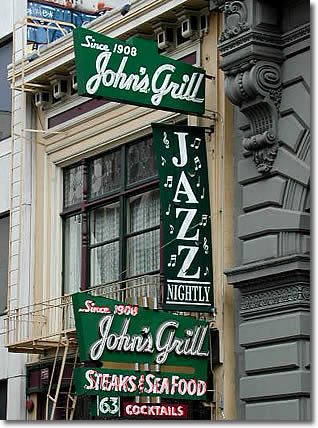 to
eat. We, or I should say I, was over on the corner of Union Square. For
some reason I thought of Les
Joulins Jazz Bistro, just a few more blocks over on
Ellis Street, and across from John's Grill, Dashiell
Hammett's old hangout. I headed towards Ellis on Powell, first having
Hammett thoughts of old San Francisco, smoky thoughts, Whiskey thoughts
of a small bar with polished brass rail and solid wood, then Les Joulins
Jazz Bistro thoughts about Miles Davis and John Coltrane and Max Roach
and Bud Powell. But now wait a moment. I didn't know too much about Bud
Powell. What kind of thoughts could I have about someone I didn't know
that much about? Was I showing signs of vagueness, just like my uncle Phil?
I pondered that as I walked through the door at Les Joulins. Then I pondered
the meaning of dying my mustache, if I had one, green.
to
eat. We, or I should say I, was over on the corner of Union Square. For
some reason I thought of Les
Joulins Jazz Bistro, just a few more blocks over on
Ellis Street, and across from John's Grill, Dashiell
Hammett's old hangout. I headed towards Ellis on Powell, first having
Hammett thoughts of old San Francisco, smoky thoughts, Whiskey thoughts
of a small bar with polished brass rail and solid wood, then Les Joulins
Jazz Bistro thoughts about Miles Davis and John Coltrane and Max Roach
and Bud Powell. But now wait a moment. I didn't know too much about Bud
Powell. What kind of thoughts could I have about someone I didn't know
that much about? Was I showing signs of vagueness, just like my uncle Phil?
I pondered that as I walked through the door at Les Joulins. Then I pondered
the meaning of dying my mustache, if I had one, green.
Or would red be better? Or redder? Or reddest? Bedder redder. I hear music, mighty fine music ... Billie Holiday?
As I said, it was Friday and Charles Unger and Valencia Hawkins are playing their usual gig, as they have been for the last ten year. They've switched some of the players over the years, but bassist Vicki Grossi and pianist Ray Brown now seem to be regulars. Vicki adds bounce, makes things swing; Ray is solid, keeps things grounded.
Valencia is in the middle of "Tokyo Blues," a Horace Silver composition she does so well she almost owns it. I find an empty stool at the corner of the long bar near the door and order a drink from Ruben, who manages the joint. For a moment I stare into the room on the other side of the bar where you expect to see a mirror. People first find the bar confusing, thinking there is a mirror in back of it. Ruben is a fine manager and a gentleman in a world in which gentlemen are an endangered species.
"What would you like?" asks Ruben, "a Negroni or a Wild Turkey?" He has the warm friendly sing-song sound that you only get out of Mexican Spanish. He makes you feel like the world is a good place, or at least could be.
Ruben has me down.
"How about a Negroni," I say, then feeling too predictable, "No, no, let's do a Sidecar."
"A Sidecar, huh?" says Ruben. "So you want a Sidecar? Yeah, no problem." He looks closely at me. But my hair is not green today. It wasn't yesterday either but it might be. Green hair goes well with a Sidecar.
"Green hair goes well with a Sidecars," I say, but Ruben does not seem to hear, which maybe is a good thing.
Now he is straining the Sidecar from a shaker into a large Martini glass.
"What do you think of green hair," I ask.
"Oh, very nice," he says. "But light green, Luis, not too dark."
"Yes, I think you are right there. To dark and it would look edible. People would think it was spinach and try to eat it."
I look around the large dining space at
Les Joulins, at the colorful paintings of musicians on the walls and
an old trombone mounted on one. There are some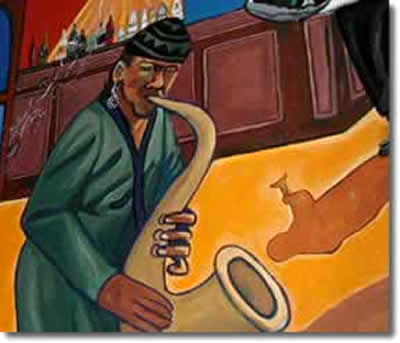 photographs
too by Rio9.
Know Rio9, or his little brother, Rio8? Wait a while
and he will be coming in and you can ask him what these numbers are all
about.
photographs
too by Rio9.
Know Rio9, or his little brother, Rio8? Wait a while
and he will be coming in and you can ask him what these numbers are all
about.
The dining room is full of tourists, as usual. Owner Osman Oner has a talent for booking whole tour groups. He gives 'em a good price and he entertains them. There is a band stand with jazz seven nights a week. Larry Douglas, BJ Papa, Cecil Wells, Bill Webster, and others. They keep the place lively and the food is relatively inexpensive. Though French, it shows the Mexican influence from Ruben's brothers who work the kitchen. Try the sword fish if you want something lively. It's cooked Baja style, wrapped in leaves and spicy. French? Well, who cares. If you want French order the snails. They got those slimy things too.
But now the Tokyo Blues is over and Valencia, taking a break, is headed my way.
"What's new?" I ask. I do not call her "my Ethiopian Queen," like Charles does, but she does look like one. Very dark with high cheek bones. She is a classy lady and a very thoughtful one as well. I like to hit her with questions, 'cause she always knows something I don't.
"This Bud Powell guy," I say, "how well do you know him?" That is joke, of course. Powell has been dead many years. She ignores it.
I tell her that I bought a CD of Bud Powell and have been listening to it.
"I keep reading that he was the world's greatest jazz pianist," I say, "but I don't hear it."
"Who's on it with him?" she asks.
"Nobody I know," I say.
"Well, that might make a difference."
I confess that I sometimes misjudge musicians the first time I hear them.
"I once threw out a Stan Getz CD because it did nothing for me the first time I played it. Then I had second thoughts. I went and got him out of the trash. That CD, Cafe Montmartre, is now my favorite."
"Really," she says, like she is listening to the confessions of a halfwit.
"Yep, it's true. Sometimes stuff goes right by me."
"Well, maybe you should listen to Bud some more."
"Right. Will do. He's certainly not going into the trash."
"Bring him to me if you're feeling that way, okay?"
Then we talk a little about that period of music of which Powell was a part, and the connection between a musician's music and his or her life. Powell was a strange character whose strangeness may well have been due to a police beating when he was twenty years old. He was said to be a shy, sensitive young man before that. The police report said he was combative. People have trouble believing that. He was so severely beaten that he could not stand up or talk afterwards. He spent time in a mental hospital. People say he never really recovered. But he could still play piano. And he was the one guy who could up Charlie Parker in a session. They would play chorus after chorus, saxophone battling it out with the piano, if you can imagine that. Usually the battle is between players of the same instrument, the most battle-prone being trumpet players.
Most of his life, Powell was taken care of by friends. Saxophonist Jackie McClean was one of those who watched over him and took him home from sessions. Then he was out of touch with Powell for some years but went to hear him in Paris where Powell was playing. When McClean walked into the club, Powell, who was playing, spotted him, got up right in the middle of the session and said, "Jackie, you goin' to take me home?" McClean said yes but that Powell should get back up on stage and finish the set. He did.
You got the picture? Sad. Greatness and sadness. Talent and injury. Wonder and pity. Yet the world is full of that. It is an uneven kind of place. A place with rough edges and broken glass. Add the Bushman and it's all broken glass and crushed skulls. What would Powell have been if ...? Who knows. We have the Powell we have. It's a story. How would you or I, little you-i, be with our heads caved in with clubs. Nil, would be my guess.
I asked Valencia how she worked on a new song.
"I try to personalize it," she said. She suggested that leaning a new song in three different tempos was a good thing too.
Billie Holiday on singing the blues: "I don't think I ever sing the same way twice. And I don't think I ever sing the same tempo. One night it's a little bit slower, the next night it's a little bit brighter ... The blues is sort of mixed up thing. You just have to feel it." And there is another sad story. But we won't get into that.
"Care for a Gran Marnier?" I asked. That is Valencia's drink at Les Joulins when she is not drinking mint tea.
She smiled yes. She went around to the other side of the restaurant, the side that looks like it is the reflection of a non-existent bar mirror, to be with her tea. She hangs out over there, if it is not filled with tourists, to collect herself between sets.
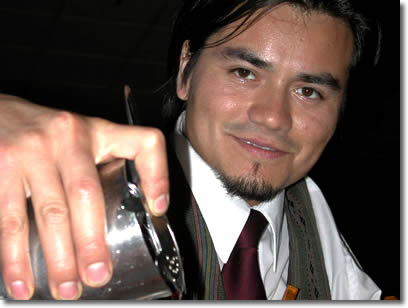
"Ruben," I said, "could I get a Gran Marnier for Valencia?"
"Sure," he said. "How is that Sidecar?" he asked.
"Good," I said. "I feel like I'm on a motorcycle cruising through the countryside in Michoacan just after getting my hair died green."
"Light green, not too dark," said Ruben.
"Medium green, as in the flag of Mexico."
"That would be okay too. It stand for hope."
"Hope and independence," I say.
"Hey, you know you're history."
"I am history," I said. "The history of green."
Ruben looked worried.
Green but not mean,
White as light,
Red but not dead,
& talking nonsense,
I have survived the Bushman.
I took the Gan Marnier over to Valencia.
"Cheers!" I said. "I only meant to stop by for a moment." It is easy to get trapped in a conversation with Valencia. But I have other places I need to hit before the night is over.
Back on the street it was all ghosts. Caen, Hammett, Miles Davis, Billie Holiday, Bud Powell ... I was wondering what to do next when suddenly beside me was another ghost: Uncle Phil, or Uncle P, as he is, or was, known in the family.
"Dear boy," he said, "it has been awhile."
He slapped me on the shoulder and stuffed a cigar in my pocket.
"Uncle P, I thought you were ..."
"Dead, my boy? Hardly. I've been around, just hard to spot. Like Miles and those other cats over there. Been getting some tips from Miles, by the way. On the 'other side' you get to study with the best. Course he won't let me sit in yet. He's a picky son of a bitch."
"So how long are you here?" I asked.
"Just this night, boy. Tomorrow I'm off for Paris."
"Well, what would you like to do, Uncle P? I was just thinking of heading up Powell, then up O'Farrell into the Tenderloin."
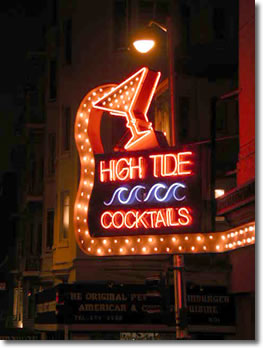
"Sounds good to me, boy."
"We could go see Sue at the High Tide."
"Does she have any friends?"
"You mean like ladies?" I ask Uncle Phil.
"Well, I didn't mean boyfriends," said Uncle Phil jabbing me in the ribs with his elbow.
"I think we would have to go over to Empire for that, Uncle P. Or Sunflower or Rainbow or ... By the way, I ran into Auntie El today and ..."
Poof! Sad, but Uncle Phil suddenly disappeared on the corner of Mason and O'Farrell. There are things I wanted to ask him. I wanted to know what the food was like up there, if he was really "up there" and not confusing "up" with "down." Do that myself sometimes. I wanted to know how it compared with San Francisco. And was there music, other than little tinkling bells and harps. Were there sad days too? Not just all smiles and good will? It seemed like smiles could get boring after awhile. Pondering all these thoughts, I headed up to the High Tide where Sue, a Korean lady of considerable charm, presides. She's the queen of the Tenderloin and a royal one.
San Francisco. It's a swell place. Walk around it, take time to talk, and you will have the time of your life. And don't let the ghosts bother you. They're mostly friendly, right, Hammett?
Home | City Notes | Restaurant Guide | Galleries | Site Map | Search | Contact